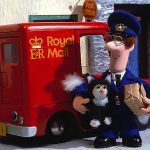A man in his fifties reclines on a couch, cucumber slices over his eyes. A door opens. “Two minutes,” he’s told. He says thank you, sighs, and then moves as if to lift the cucumber slices from his eyes, but instead proceeds to pull two full-sized cucumbers out of his sockets. The shot follows his hand halfheartedly fumbling around for the pair of eyeballs on the coffee table next to him, lying amongst bowls of other round things (cherries, some olives).
This Willy Wonka, this Magical Mister Mistoffelees, this Pippy Longstocking of a man is Stephen Colbert, resident host of CBS’s The Late Show, and this fantastical scene was a cold open which ran before the introductory credits in a recent episode. It’s just gone one year since Colbert moved into the Ed Sullivan Theatre, previously occupied by David Letterman. The transition has been fascinating to witness. It has required so much of Colbert; not only has he had to follow a great act, but he’s had to shed one skin and present a whole new person to the world.
On his former project, The Colbert Report, which is excellent enough to be included in a capsule shot into outer space to introduce Western Culture to extraterrestrials, he hosted the show entirely in character, playing a self-righteous, ultra-conservative, super-Catholic, right-wing pundit named: Stephen Colbert. “And to our Spanish viewers,” he would say when December rolled around, “‘Merry Christmas.’ Learn English.”
It was rare to catch a glimpse of the real Stephen. In 2006 he gave what the Washington Post calls “the most controversial [White House] Correspondent’s Dinner speech ever”, his overly boorish character wholeheartedly defending Bush, slaying him with every word. In 2010 (despite being asked to leave) he testified, in character, before Congress about conditions faced by migrant workers. He offered his vast expertise on this hot topic after spending a day as a farmhand. “America is far too dependent on immigrant labour to pick our fruits and vegetables,” he stated, straight faced. “Now, the obvious answer is for all of us to stop eating fruits and vegetables.”
In September of last year Colbert began his new job as the Real Stephen. His fans, and maybe Colbert himself, held their breath to see who he really was and what he would bring to the late night scene. In promotional videos and podcasts leading up to the show’s debut, Colbert pondered questions like “Who is Me?”, trying to brainstorm what form he would now take. What would be underneath the faux-Republican coating he’d be wearing for the last nine years?

A little like seeing your teacher in the supermarket, the initial months of The Late Show with Stephen Colbert had a mild awkwardness about them. Without the foil of a character Colbert seemed exposed, vulnerable, and sometimes it made you want to look away out of respect. But before long something new emerged. It was a new kind of Colbert. This one lives in a world of magical realism, pulling cucumbers from his sockets, declaring things into law while wearing a big furry hat, and constantly consulting Lincoln’s ghost. He has shrouded himself in mystery and made himself a living question mark – a new foil for a new era.
The Late Show has come into its own over the last few months, propelled forward by the brilliancy of its political commentary. And what a time to have a knack for it. Its coverage of the national conventions had the electricity of that former devil-may-care Comedy Central employee we all knew and loved. A bit of that superlative badassery reared its head as Colbert forced himself more than once onto the stage at the DNC and made Hunger Games-y speeches into the microphone, running circles around security. That is great television.
Slowly but surely Colbert has incorporated what worked for the Report into The Late Show and it’s all the better for it. It feels as though he has liberated himself from the idea that he had to give it all up and start completely fresh. Hardcore fans will recognise familiar joke structures, a favourite of which is using an outrageous reason to “justify” someone’s actions. This works well for any joke at Donald Trump’s expense. The candidate’s “expertise” on marriage and family is only natural since he has had so many of them, etc etc.
The most interesting aspect of the Old Colbert carried over from the Report is his Catholicism. There is even a widespread rumour about him teaching Sunday School. Many must have presumed that the religious nature of his former character would fall away in the rebirthing, along with his rampant ignorance and deep hatred of bears (Satan’s children). But it wasn’t the religion of the Old Colbert that was backward and bigoted, it was his religiosity. This was a harsh, Blakean scolding of his own kind, and it was joyous to watch. As Christians it’s only right that we should be our most attentive critics.
His use of faith in comedy is confident and hardy, like he’s secure enough to play with it a bit. If a politician’s actions don’t match the piety of their words, he will throw up an old-timey painting of Jesus with a hideous and hilarious misquote. When Trump feuded with Pope Francis last February, Colbert commented, “It’s like Jesus said: ‘Blessed are the poor, unless they said something bad about me – then screw ‘em.’”
Faith-related recurring characters (God, projected onto the studio’s ceiling) and segments (Stephen Colbert’s Late Night Confessions) are now staples of the show. While it could easily be argued that these are borderline blasphemous, their content is pretty benign. Plus, none of his contemporaries have any interest in even thinking about God or morality on their shows, and some do less than nothing, like the acerbic John Oliver, who is plainly contemptuous of it. Admittedly, pointing this out sounds reminiscent of a backseat teenager explaining their music choices on the way home from Youth Group (“They do swear sometimes but that’s because they’re a band of Christians, not a Christian band!”). But some credit (and sympathy!) is due here for a man who could have so easily just made it Not A Thing. He could keep it private or just abandon it altogether. He’s a television personality, not a politician, so who cares if he’s not religious? But there he is, chatting about Philippians with Tim Kaine. Why does he do it? Is it one man’s public witness in his day (okay, late night) job? There aren’t heaps of other reasons that make sense. Catholic guilt?
Last November an interview with the atheist political commentator Bill Maher went something like this:
Maher: We’re pretty opposite.
Colbert: In what way are we opposite?
M: Well, you’re married and religious.
C: I’m married and I give religion a shot, I give it a shot.
M: I thought you were a practising Catholic!
C: I am a practising Catholic but that doesn’t mean I’m good at it! I suck. I suck as a Catholic.
Colbert goes on to point out that Maher was raised Catholic. Warmly, half joking, he implores him to return to the fold. “Come on back, Bill! The door is always open, it’s never too late!”
He’s made room for faith in an arena where there is usually none at all, and I’m betting that that is an extremely difficult thing to do. He may not be doing it perfectly, but at least he’s doing it. It’s probably more than most of us are doing at the office. He’s an example, however flawed, to an international audience that faith is a Real Thing and that there are talented, intelligent, and even brilliant people out there who grapple with it, trip over it, fumble around with it. Every weeknight millions of people all over the world watch this man, and remember that, hey, he gives it a shot.














